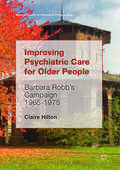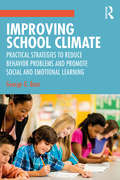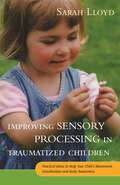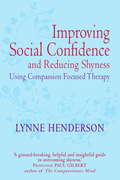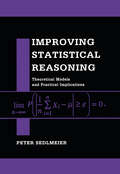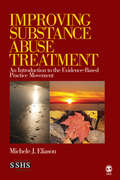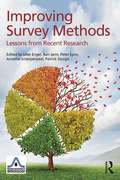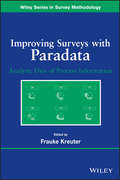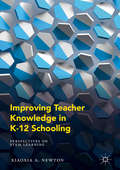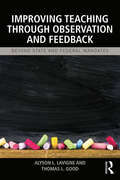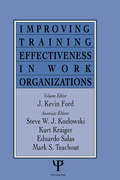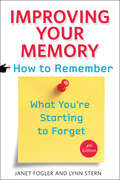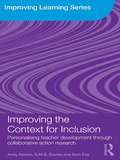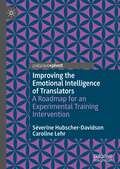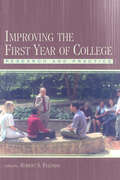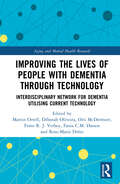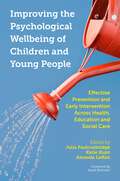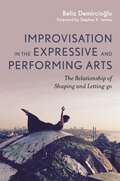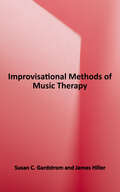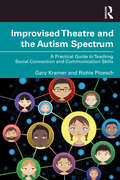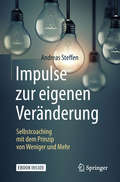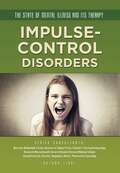- Table View
- List View
Improving Psychiatric Care for Older People
by Claire HiltonThis book is open access under a CC BY 4. 0 license. This book tells the story of Barbara Robb and her pressure group, Aid for the Elderly in Government Institutions (AEGIS). In 1965, Barbara visited 73-year-old Amy Gibbs in a dilapidated and overcrowded National Health Service psychiatric hospital back-ward. She was so appalled by the low standards that she set out to make improvements. Barbara's book Sans Everything: A case to answer was publicly discredited by a complacent and self-righteous Ministry of Health. However, inspired by her work, staff in other hospitals 'whistle-blew' about events they witnessed, which corroborated her allegations. Barbara influenced government policy, to improve psychiatric care and health service complaints procedures, and to establish a hospitals' inspectorate and ombudsman. The book will appeal to campaigners, health and social care staff and others working with older people, and those with an interest in policy development in England, the 1960s, women's history and the history of psychiatry and nursing.
Improving School Climate: Practical Strategies to Reduce Behavior Problems and Promote Social and Emotional Learning
by George G. BearImproving School Climate provides evidence-based and practical strategies for cultivating a healthy school environment, while also avoiding behavior problems. The book is packed with strategies centered on key components and conditions for a positive school climate, such as positive teacher-student relationships, positive student-student relationships (including absence of bullying), supportive home-school relationships, student engagement, effective classroom management and school discipline, school safety, and student self-discipline. This text is an important inclusion for educators and school psychologists who prefer a structured, evidence-based, and practical approach for improving school climate, while also promoting students’ academic achievements, preventing behavior problems, and fostering students’ social and emotional competencies.
Improving Sensory Processing in Traumatized Children: Practical Ideas to Help Your Child's Movement, Coordination and Body Awareness
by Sarah LloydDoes your child struggle to know how their body is feeling? Do they find it hard to balance or feel uneasy when their feet leave the ground? Early trauma and neglect can have a profound effect upon a child's development. Sensory integration theory offers a way of understanding how the brain processes and stores movement experience, and how these experiences manifest at a physical and emotional level. This book explains how early movement experiences affect brain development and gives examples of how trauma can prevent basic sensory processing pathways from being correctly established. It shows how you can identify gaps in normal sensory development and offers ideas for how you can use physical activities to help build up the underdeveloped systems. Good bodily awareness forms the foundation of motor development as well as social and emotional skills and learning. This book will help your child to be more in tune with themselves and their bodies and feel more comfortable in their environment. Highly accessible with lots of practical tips and examples, this book is written for adoptive and foster parents, and will also be useful for social workers, fostering and adoption workers and those working in primary and early years educational settings.
Improving Social Confidence and Reducing Shyness Using Compassion Focused Therapy: Series editor, Paul Gilbert
by Lynne HendersonShyness can affect most of us to varying degrees, and tends to affect children more than adults as people tend to grow in confidence as they get older. It is therefore a universal emotion but in some people it is a more pronounced personality trait. Severe shyness is referred to as 'social anxiety disorder', however this self-help book is written for the people experiencing different degrees of shyness. Shyness has evolved as an emotion over thousands of years and can be helpful in some circumstances, however normal shyness can become chronic thanks to negative thoughts, avoidance and withdrawal. While shyness has its functions, it becomes a problem when it interferes with life goals, develops into social anxiety disorder or leads on to 'learned pessimism', mild depression and even 'learned helplessness'. This self-help book, based on the groundbreaking new Compassion Focused Therapy, sets out the background to shyness - its evolutionary functions, why it becomes chronic in some people, and sets out skills and exercises based on CFT to help the reader overcome problematic shyness.
Improving Social Confidence and Reducing Shyness Using Compassion Focused Therapy: Series editor, Paul Gilbert
by Lynne HendersonShyness can affect most of us to varying degrees, and tends to affect children more than adults as people tend to grow in confidence as they get older. It is therefore a universal emotion but in some people it is a more pronounced personality trait. Severe shyness is referred to as 'social anxiety disorder', however this self-help book is written for the people experiencing different degrees of shyness. Shyness has evolved as an emotion over thousands of years and can be helpful in some circumstances, however normal shyness can become chronic thanks to negative thoughts, avoidance and withdrawal. While shyness has its functions, it becomes a problem when it interferes with life goals, develops into social anxiety disorder or leads on to 'learned pessimism', mild depression and even 'learned helplessness'. This self-help book, based on the groundbreaking new Compassion Focused Therapy, sets out the background to shyness - its evolutionary functions, why it becomes chronic in some people, and sets out skills and exercises based on CFT to help the reader overcome problematic shyness.
Improving Statistical Reasoning: Theoretical Models and Practical Implications
by Peter SedlmeierThis book focuses on how statistical reasoning works and on training programs that can exploit people's natural cognitive capabilities to improve their statistical reasoning. Training programs that take into account findings from evolutionary psychology and instructional theory are shown to have substantially larger effects that are more stable over time than previous training regimens. The theoretical implications are traced in a neural network model of human performance on statistical reasoning problems. This book apppeals to judgment and decision making researchers and other cognitive scientists, as well as to teachers of statistics and probabilistic reasoning.
Improving Substance Abuse Treatment: An Introduction to the Evidence-Based Practice Movement
by Michele J. EliasonThis book is an attempt to bridge the gap between research on substance abuse treatment programs and what actually goes on in the field of substance abuse treatment. It is aimed at both the academic and practitioner market (as is Perkinson) and it clearly describes how to determine what evidence based practice is and it addresses some of the challenges that practioners and agency directors might face in implementing EBP. The book is well-written and highly practical. It contains two complete case studies that outline two examples of Evidence based practice which will be particularly useful in the course market.
Improving Survey Methods: Lessons from Recent Research (European Association of Methodology Series)
by Uwe Engel Ben Jann Peter Lynn Annette Scherpenzeel Patrick SturgisThis state-of-the-art volume provides insight into the recent developments in survey research. It covers topics like: survey modes and response effects, bio indicators and paradata, interviewer and survey error, mixed-mode panels, sensitive questions, conducting web surveys and access panels, coping with non-response, and handling missing data. The authors are leading scientists in the field, and discuss the latest methods and challenges with respect to these topics. Each of the book’s eight parts starts with a brief chapter that provides an historical context along with an overview of today’s most critical survey methods. Chapters in the sections focus on research applications in practice and discuss results from field studies. As such, the book will help researchers design surveys according to today’s best practices. The book’s website www.survey-methodology.de provides additional information, statistical analyses, tables and figures. An indispensable reference for practicing researchers and methodologists or any professional who uses surveys in their work, this book also serves as a supplement for graduate or upper level-undergraduate courses on survey methods taught in psychology, sociology, education, economics, and business. Although the book focuses on European findings, all of the research is discussed with reference to the entire survey-methodology area, including the US. As such, the insights in this book will apply to surveys conducted around the world.
Improving Surveys with Paradata
by Frauke KreuterExplore the practices and cutting-edge research on the new and exciting topic of paradataParadata are measurements related to the process of collecting survey data.Improving Surveys with Paradata: Analytic Uses of Process Information is the most accessible and comprehensive contribution to this up-and-coming area in survey methodology.Featuring contributions from leading experts in the field, Improving Surveys with Paradata: Analytic Uses of Process Information introduces and reviews issues involved in the collection and analysis of paradata. The book presents readers with an overview of the indispensable techniques and new, innovative research on improving survey quality and total survey error. Along with several case studies, topics include:Using paradata to monitor fieldwork activity in face-to-face, telephone, and web surveysGuiding intervention decisions during data collectionAnalysis of measurement, nonresponse, and coverage error via paradataProviding a practical, encompassing guide to the subject of paradata, the book is aimed at both producers and users of survey data. Improving Surveys with Paradata: Analytic Uses of Process The book also serves as an excellent resource for courses on data collection, survey methodology, and nonresponse and measurement error.
Improving Teacher Knowledge in K-12 Schooling: Perspectives On Stem Learning
by Xiaoxia A. NewtonThis volume examines how several key components of the mathematics education system in the United States fail to provide teachers with adequate and effective tools to teach mathematics in K-12 classrooms. These components consist of teachers’ own learning experiences as students in K-12 classrooms, their undergraduate or graduate trainings in mathematics, and their in-service professional development trainings. Newton argues that unless we improve these system components as a whole and recognize the importance of teaching future mathematics teachers explicitly and rigorously the topics they are expected to teach, teachers will continue to recycle a body of incoherent and incomprehensible mathematical knowledge to their students, because these are the only types of mathematical knowledge they have at their disposal, both in terms of what they themselves have learned as K-12 students and in terms of the mathematical resources available to them, including the textbooks they rely on to teach as mathematics teachers.
Improving Teaching through Observation and Feedback: Beyond State and Federal Mandates
by Alyson L. Lavigne Thomas L GoodIn response to Race to the Top, schools nationwide are rapidly overhauling their teacher evaluation processes. Often forced to develop and implement these programs without adequate extra-institutional support or relevant experience, already-taxed administrators need accessible and practical resources. Improving Teaching through Observation and Feedback brings cutting-edge research and years of practical experience directly to those who need them. In five concise chapters, Thomas Good and Alyson Lavigne briefly outline the history of RttT and then move quickly and authoritatively to a discussion of best practices. This book is a perfect resource for administrators reworking their processes for new evaluation guidelines.
Improving Training Effectiveness in Work Organizations (Applied Psychology Series)
by J. Kevin Ford Eduardo Salas Kurt Kraiger Steve W. J. Kozlowski Mark S. TeachoutThis compelling volume presents the work of innovative researchers dealing with current issues in training and training effectiveness in work organizations. Each chapter provides an integrative summary of a research area with the goal of developing a specific research agenda that will not only stimulate thinking in the training field but also direct future research. By concentrating on new ideas and critical methodological and measurement issues rather than summarizing existing literature, the volume offers definitive suggestions for advancing the effectiveness of the training field. Its chapters focus on emerging issues in training that have important implications for improving both training design and efficacy. They discuss various levels of analysis-- intra-individual, inter-individual, team, and organizational issues--and the factors relevant to achieving a better understanding of training effectiveness from these different perspectives. This type of coverage provides a theoretically driven scientist/practitioner orientation to the book.
Improving Your Memory: How to Remember What You're Starting to Forget
by Janet Fogler Lynn SternAn essential handbook packed with proven techniques for remembering what you don’t want to forget.In the years since the previous edition of Improving Your Memory was published, technology has dramatically changed how we keep track of life’s many details. Appliances and car lights turn themselves off, smartphones and computers remind us of appointments, and Google lets us search for the information that we can’t remember. Still, we grow frustrated and anxious when words won’t come, when we misplace items, or when we forget meetings, birthdays, names. University of Michigan social workers Janet Fogler and Lynn Stern have completely updated their friendly and usable guide to memory improvement techniques. Recognizing that people worry something is wrong with them when they forget things, Fogler and Stern suggest that the antidote to worry is taking positive actions to help us remember what we want to remember. They provide readers with tools for understanding and improving memory, including sixteen helpful exercises. Simple techniques like writing information down, creating a catch word or phrase, altering something in your environment, and reviewing details in advance can put you actively in charge of retrieving information more easily. As in previous editions, Improving Your Memory reinforces memory techniques through real-life examples. This accessible handbook also discusses how memory works; how it changes with age, stress, illness, and depression; and why people remember what they do. Many readers will see immediate improvement in their memory after reading the book.
Improving the Context for Inclusion: Personalising Teacher Development through Collaborative Action Research (Improving Learning)
by Sam Fox Andy Howes S.M.B. DaviesThis timely book addresses the need for increasing multi-agency capacity in schools, as the success of initiatives such as ‘Every Child Matters’ or ‘personalised learning’ depends on teachers understanding the challenges faced by young people in learning effectively and happily in their school. The authors of this thought-provoking book present and analyse case studies of collaborative action research, illustrating what is needed in practice for teachers to engage with inclusion for the benefit of their pupils and themselves. The essential elements of success with inclusion are revealed, including: the importance of identifying issues that teachers see as relevant; how teachers can achieve meaningful collaboration in addressing the issues; the necessity of paying careful attention to the consequences of the changes that they make; incorporating practical considerations such as critical support from outsiders; the role of facilitators such as educational psychologists in working with groups of teachers to support their development through action research; how to facilitate change through making use of resources that are already available in the education system. Improving the Context for Inclusion is fascinating reading for all students of education, especially those with an interest in inclusion. Teachers, school leaders and those working in education services will gain an invaluable insight in to how to create an inclusive school environment.
Improving the Emotional Intelligence of Translators: A Roadmap for an Experimental Training Intervention (Palgrave Studies in Translating and Interpreting)
by Séverine Hubscher-Davidson Caroline LehrThis book provides a unique roadmap for the design of an effective emotional intelligence (EI) intervention adapted to the needs of translators. Building on the growing interest in understanding the impact of translators’ emotions on their work, this book is the first to outline the key components of an 18-hour training intervention based on a sound theoretical basis and aiming to improve translators’ emotional competencies. Following a detailed review of the relevant literature in both translation studies and psychology, the book demonstrates the importance of soft skills for translators’ wellbeing, psychological health, and work performance. A number of important elements that need to be considered when designing an evidence-based intervention are discussed, such as appropriate safeguards, theory-based activities, psychometric measures, individual difference variables, and suitable coaching techniques. The book concludes with a discussion of other relevant aspects, such as the role of culture in EI interventions and promising areas for further study. It will appeal to students and scholars of translation studies, researchers interested in personality, occupational and developmental psychology, as well as professional translators and their representative bodies.
Improving the First Year of College: Research and Practice
by Robert S. FeldmanThe first year of college represents an enormous milestone in students' lives. Whether attending a four-year or two-year institution of higher education, living on campus or at home, or enrolled in a highly selective school or a college with an open-admissions policy, students are challenged in unique and demanding ways during their first year.Although many students rise to the challenges they face, for some the demands are too great. Retention rates beyond the first year are disappointing: one third of first-year students seriously consider leaving college during their first term, and ultimately one half of all students who start college complete it.What are the factors that impact students during their first year? How can the academic and social experiences of first-year students be optimized? What can we do to improve retention rates to maximize the number of students who complete college? Improving the First Year of College employs a variety of perspectives from leading researchers and student-service providers to address these questions and examine the first year of college.This volume also highlights the development of learning communities and coaching, as well as how technology impacts students' first year. Perhaps most important, the book provides examples of "best practices," as determined through research by leaders in the field, to permit educators to draw on their experiences.
Improving the Lives of People with Dementia through Technology: Interdisciplinary Network for Dementia Utilising Current Technology (Aging and Mental Health Research)
by Rose-Marie Dröes Martin Orrell Frans R. J. Verhey Déborah Oliveira Orii McDermott Fania C.M. DassenThis book explores the practical application of recent improvements in technology for people living with dementia and highlights the positive outcomes on care, quality of life, and services on patients through exploration of 15 research projects to redefine the future of dementia care. Using research compiled in collaboration with leading universities and organisations across Europe, this book demonstrates how INDUCT’s (Interdisciplinary Network for Dementia Utilising Current Technology's) findings resulted in implications for practical cognitive and social factors to improve the usability of technology, evaluating the effectiveness of specific contemporary technology, and tracing facilitators and barriers for implementation of technology in dementia care. Featuring a unique training programme along with a wide range of patient-public involvement, this state-of-the-art volume will be essential reading for researchers, academics and scholars in the fields of dementia and mental health research, gerontology, psychology and nursing.
Improving the Psychological Wellbeing of Children and Young People: Effective Prevention and Early Intervention Across Health, Education and Social Care
by Sarah Brennan Jenny Taylor Katie Hunt Julia Faulconbridge Amanda Laffan Duncan Law Iyabo Fatimilehin Laura Casale Sally Zlotowitz Natalie Seymour Mark Moubarak Chentite Ruth Butterworth Ruth O'Shaughnessy Michael Galbraith Caroline White Waveney Patel Anna Picciotto Joe Hickey Jaime Craig Sara O'Curry Sally Benson Lisa ShostakWritten for professionals spanning children's services, this must-read guide provides an authoritative overview of what shapes the psychological wellbeing of children and young people - from perinatal care and adverse childhood experiences (ACEs) through to their socioeconomic circumstances, schools and the wider community. <P><P> Contributors provide a concise overview of the evidence base, identifying current barriers to good mental health in policy and service provision, and highlighting examples of initiatives proven to be successful. Examples are drawn from health, social care, youth justice and education settings with a focus on preventative and early intervention measures. <P><P> This book is a rich resource for all professionals concerned with child wellbeing, including service providers, commissioners, professionals and students. It should serve as essential reading for students on mental health training courses.
Improving the Quality of Child Custody Evaluations
by William O'Donohue Lauren Woodward TolleThis book resolves a key problem that all evaluators need to attend to:, i.e., what constructs ought to be measured?, all the while giving them practical ways of doing this. It also presents data showing family court judges like the model, and it does this fairly briefly but in a way that is nicely embedded in the research literature.
Improvisation in the Expressive and Performing Arts: eBook
by Stephen K. Levine Beliz DemirciogluThis book explores the process of improvisation and outlines the ideal conditions for an inspirational creative state. Examining her own process as an artist and drawing on interviews with peers, the author considers how the forces of shaping (intellect-driven decisions) and letting-go (more intuitive moves) interact in improvisation.The book follows the journey of seven performing arts graduates and undergraduates, examining their experiences of improvisation and the interplay of shaping and letting-go. It reveals how the approach and methods of expressive arts can enrich an improviser's experience and spur the desire for discovery.
Improvisational Methods of Music Therapy
by James Hiller Susan C. GardstromImprovisational Methods of Music Therapy is the second in a series of textbooks addressing each of the four music therapy methods employed in a variety of clinical contexts. Students and professionals alike will gain foundational knowledge about Clinical Music Improvisation (CMI) and its many variations as pertinent to individual, dyadic, and group improvisation. <p><p> This book is specifically intended as a general roadmap for the design and implementation of therapeutically relevant, effective, and individualized improvisation experiences applicable to a wide range of clinical profiles and interpersonal and cultural contexts. As such, Improvisational Methods of Music Therapy addresses prerequisites, risks, contraindications, inherent affordances, and challenges related to CMI, with overarching considerations and procedural steps for Instrumental, Vocal, and Body Improvisation. Attention is given to the use of CMI toward both client achievement of predetermined and measurable therapeutic objectives (i.e., outcome-oriented practice) and client identification and exploration of needs as they manifest in the musicing process (i.e., experience-oriented practice). Hypothetical case illustrations and summaries of actual clinical cases highlight particular CMI variations and procedures.
Improvised Theatre and the Autism Spectrum: A Practical Guide to Teaching Social Connection and Communication Skills
by Gary Kramer Richie PloeschThis guide provides educators, professionals, and parents with an easy-to-follow and comprehensive approach to utilizing improvised theatre as a tool to teach social and communication skills to individuals on the autism spectrum. Opening with the philosophy of the curriculum and the considerations of mental health, play, and environmental factors on individuals with autism, the book then breaks down specific activities, suggests course sequencing, and explains how each activity works and applies to desired outcomes. Packed with dozens of activities and explanations, the book includes all the information necessary to design a full curriculum or create an at-home learning program for parents. By combining the fun and engaging atmosphere of improvisational theatre with the systematic teaching of social skills, professionals and parents can cultivate learning in a way that keeps students engaged while providing long-lasting improvements in social interaction, self-confidence, and communication.
Impulse
by Eva MuñozWelcome, Motor Heads, Rally Girls, and Hangers-On! It’s another wild ride here at the Gathering—the underground world of fast cars, crazy drivers, and partying all night long. If you’re here, it means you’ve broken curfew. Not something the ruling Mob of Terra One encourages, but we’re all in the same boat, so let’s rock it! As long as you’ve paid off your local Associate, you’ll be fine. Maybe. Tonight’s race features racing royalty, ladies and gents! Let’s welcome seventeen-year-old Rebecca “RC” Camille, third in the Driver’s Index. She lives to race. Nothing but motor oil running through her veins, folks. Her aim? To be number one, beating out two of the boys she grew up with at the Open Arms orphanage. She’s lethal in her GT500KR. Nothing gets in her way. Not a sense of brotherhood. Not even love. Her challenger tonight? A psychotic serial killer willing to stop at nothing to eliminate the competition. Can RC stop him before he kills his way to the top? Or will she need reinforcements from the authority we all love to hate? Remember, children, the Mob never gives away their help for free.
Impulse zur eigenen Veränderung: Selbstcoaching mit dem Prinzip von Weniger und Mehr
by Andreas SteffenLassen Sie sich von diesem Selbstcoaching-Buch inspirieren, wie Sie sich persönlich weiterentwickeln könnenIn seinem Sachbuch „Impulse zur eigenen Veränderung“ gibt Ihnen Autor Andreas Steffen eine Vielzahl von Anregungen und Übungsmöglichkeiten zum Selbstcoaching. Es geht darin um Themen wie:SelbstwirksamkeitWahrnehmungWiderstandskraftSelbstannahmeAkzeptanzAchtsamkeitSinnhaftigkeitGlaubenssätzeEigenverantwortungEntscheidungsfähigkeitAndreas Steffen verfolgt damit das Ziel, Ihnen Impulse für Ihren ganz persönlichen Weg der Veränderung zu geben. Sie finden in seinem Selbstcoaching-Buch tolle Anregungen, Werkzeuge, Modelle, Methoden und auch verschiedene Übungen „für den Hausgebrauch“ - also für Ihr ganz persönliches Selbstcoaching. Mit Selbstcoaching die Basis für neue Entwicklungen schaffen, Ziele setzen und diese erreichenDer Autor verfolgt damit das Ziel, Ihnen Impulse für Ihren ganz persönlichen Weg der Veränderung zu geben. Wenn Sie etwas in Ihrem Leben verändern wollen, dann ist es entscheidend, dass Sie Ihre eigene Ausgangssituation erkennen und akzeptieren. Dieser Schritt ist beim Coaching in Entwicklungsprozessen von sehr großer Bedeutung – und erst recht beim Selbstcoaching. Erst dann ist eine positive Veränderung möglich und Sie können sich selbst ein realistisches Ziel für Ihre persönliche Entwicklung setzen. Die Fähigkeit zur Veränderung liegt in jedem von uns. Oft ist dieses Potenzial jedoch hinter einschränkenden Glaubenssätzen und unter viel emotionalem Ballast verborgen, die uns in unserer Motivation bremsen. Dieses Selbstcoaching-Buch vermittelt Ihnen, dass Sie mit einer gesunden Einstellung zu sich selbst, zu den eigenen Gedanken, Emotionen und Gefühlen sowie zur umgebenden Welt die optimale Basis für positive Veränderungen, Selbstwirksamkeit und zukünftige Entwicklungen in Ihrem Leben schaffen. Hierfür werden Ihnen Impulse durch leicht anwendbare Werkzeuge, praxistaugliche Methoden, anschauliche Beispiele und vielfältige Denkanstöße angeboten.
Impulse-Control Disorders (The State of Mental Illness and Its Ther #19)
by Autumn LibalHave you ever known that you shouldn't do something, but just couldn't stop yourself? Of course you have! Perhaps you couldn't resist having one more piece of birthday cake. Maybe your brother or sister made you so mad that you couldn't help yelling. Everyone experiences uncontrollable impulses like these sometimes. But what if these impulses happened to you all the time? How would you interact with your family, do your work at school, or make friends if you couldn't control your impulses? Jeremiah, for instance, loved fire. He loved everything about it--the way it looked, the way it smelled, how its heat enveloped everything. Even though he knew it was wrong, Jeremiah lit fires and watched them incinerate, eat, and destroy everything in their paths. Jeremiah also liked the smoke detectors in his house. He loved taking them apart. Sometimes, after school, Jeremiah would sit in his room, dismantle the smoke detector piece by piece, and then put it back together. Once the smoke detector was reassembled, Jeremiah would light a match beneath it and time how many seconds it took before the detector let out its high-pitched squeal. People like Jeremiah cannot control all the impulses they feel. Some people may get uncontrollably angry, steal, light fires, gamble, pull their own hair, or perform other impulsive actions that are harmful to themselves, their families, and their friends. When a person has repetitive impulses like these, he may be suffering from a psychiatric condition known as an impulse-control disorder. The stories and information in this book will tell you more about impulse-control disorders, how they affect people's lives, and how they can be treated.
